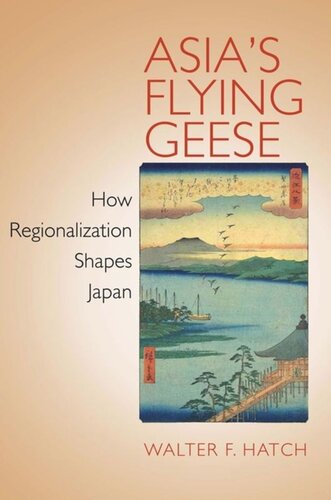

Most ebook files are in PDF format, so you can easily read them using various software such as Foxit Reader or directly on the Google Chrome browser.
Some ebook files are released by publishers in other formats such as .awz, .mobi, .epub, .fb2, etc. You may need to install specific software to read these formats on mobile/PC, such as Calibre.
Please read the tutorial at this link: https://ebookbell.com/faq
We offer FREE conversion to the popular formats you request; however, this may take some time. Therefore, right after payment, please email us, and we will try to provide the service as quickly as possible.
For some exceptional file formats or broken links (if any), please refrain from opening any disputes. Instead, email us first, and we will try to assist within a maximum of 6 hours.
EbookBell Team

4.1
50 reviewsIn Asia's Flying Geese, Walter F. Hatch tackles the puzzle of Japan's paradoxically slow change during the economic crisis it faced in the 1990s. Why didn't the purportedly unstoppable pressures of globalization force a rapid and radical shift in Japan's business model? In a book with lessons for the larger debate about globalization and its impact on national economies, Hatch shows how Japanese political and economic elites delayed—but could not in the end forestall—the transformation of their distinctive brand of capitalism by trying to extend it to the rest of Asia.For most of the 1990s, the region grew rapidly as an increasingly integrated but hierarchical group of economies. Japanese diplomats and economists came to call them "flying geese." The "lead goose" or most developed economy, Japan, supplied the capital, technology, and even developmental norms to second-tier "geese" such as Singapore and South Korea, which themselves traded with Thailand, Malaysia, and the Philippines, and so on down the V-shaped line to Indonesia and coastal China. Japan's model of capitalism, which Hatch calls "relationalism," was thus fortified, even as it became increasingly outdated. Japanese elites enjoyed enormous benefits from their leadership in the region as long as the flock found ready markets for their products in the West.The decade following the collapse of Japan's real estate and stock markets would, however, see two developments that ultimately eroded the country's economic dominance. The Asian economic crisis in the late 1990s destabilized many of the surrounding economies upon which Japan had in some measure depended, and the People's Republic of China gained new prominence on the global scene as an economic dynamo. These changes, Hatch concludes, have forced real transformation in Japan's corporate governance, its domestic politics, and in its ongoing relations with its neighbors.